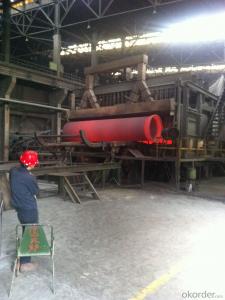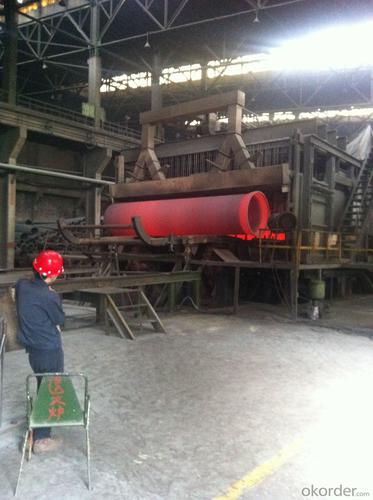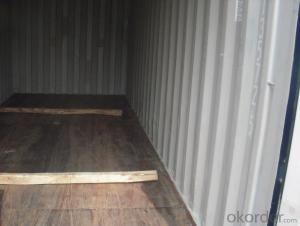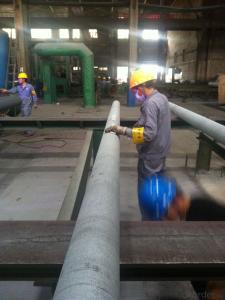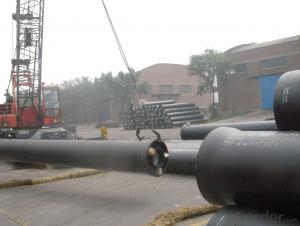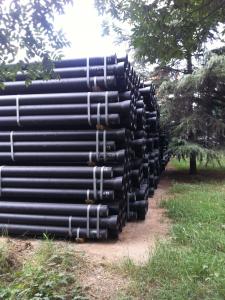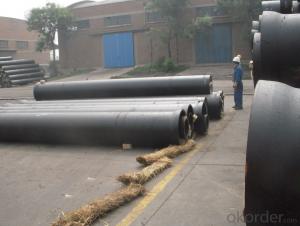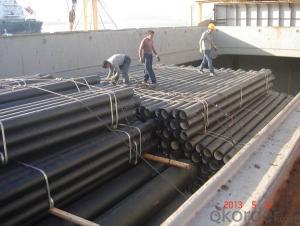DUCTILE IRON PIPE AND PIPE FITTINGS K7 CLASS DN1000
- Loading Port:
- Tianjin
- Payment Terms:
- TT OR LC
- Min Order Qty:
- 23 pc
- Supply Capability:
- 3000 pc/month
OKorder Service Pledge
OKorder Financial Service
You Might Also Like
· Material : Ductile Cast Iron
· Size Range : DN 80mm to DN 2000mm
· Unit Effective Length : 6m or 5.7m
· Manufacture Standard: ISO 2531:1998/ EN 545:2006/EN 598:2007
· Annual capacity : 200,000 tons
· Coating Exterior: Zinc 130g/m2 according to ISO 8179-1 and bitumen coating 70 microns.
· Cement Interior: Portland Cement/ High Alumina Cement/ Sulphate Resisting Cement Lining according to ISO 4179
· Special requirements on external coating and internal lining can be applied
· We also provide accessories such as SBR/EPDM rubber gaskets, lubricant paste, pipe caps, PE sleeves, etc.
Additional Parts:
Each pipe is strictly inspected according to related standard to ensure permanently high performance.
Easy Installation at site and service free for life
Long Service Lifespan
Quotation will arrive you within 24hours once we get your inquiry.
We guarantee offering you a competitive price.
A copy of original inspection reports of pipes will be offered after shipment.
Photos of loading process will be sent to the customer after shipment effect.
We will follow-up the delivery progress after shipment effect and update to the customer on weekly basis.
- Q: Are ductile iron pipes suitable for use in irrigation canals?
- Yes, ductile iron pipes are suitable for use in irrigation canals. Ductile iron pipes are known for their strength, durability, and resistance to corrosion, making them ideal for transporting water in irrigation systems. They can handle high-pressure flows and are capable of withstanding the challenging conditions of irrigation canals.
- Q: How are ductile iron pipes protected against external soil loads?
- Ductile iron pipes are protected against external soil loads through a combination of proper installation techniques and the use of protective coatings. The pipes are installed in a manner that allows for adequate support and backfilling, which helps distribute the external soil loads evenly. Additionally, these pipes are often coated with materials such as epoxy or polyethylene to provide a barrier between the pipe and the surrounding soil, preventing corrosion and damage from external forces. This protective coating ensures the longevity and durability of ductile iron pipes in underground applications.
- Q: How are ductile iron pipes protected against abrasion or wear?
- Ductile iron pipes are protected against abrasion or wear through various methods, including external coatings and linings. These protective measures serve to create a barrier between the pipe's surface and any potential abrasive materials or fluids it may come into contact with. Additionally, the use of sacrificial anodes and cathodic protection systems can also help prevent corrosion and extend the lifespan of the pipes.
- Q: How does ductile iron pipe handle soil movement?
- Ductile iron pipe possesses exceptional strength and durability, making it highly effective in managing soil movement. When the surrounding soil shifts or settles, ductile iron pipes can flex and adapt to this movement without compromising their structural integrity. The ability of ductile iron pipes to handle soil movement stems from their inherent capacity to endure bending and stretching. They have a remarkable level of flexibility, allowing them to adjust to ground shifts and settle without experiencing any breakage or cracks. This flexibility arises from the distinctive material properties of ductile iron, a type of cast iron that has been treated with magnesium to enhance its strength and elasticity. Furthermore, ductile iron pipes are constructed with a thick wall, which enhances their resistance against soil movement. This robust construction assists in distributing the forces exerted by the shifting soil, minimizing the impact on the pipe and preventing significant damage. Moreover, ductile iron pipes are typically installed with suitable bedding and backfill materials to provide additional support and stability. This involves using compacted soil or engineered granular materials around the pipe, which helps evenly distribute the load and reduces the potential for soil movement. Overall, ductile iron pipe is an excellent choice for areas with high soil movement, such as regions with expansive or unstable soils. Its flexibility, strength, and proper installation techniques enable it to effectively handle the challenges presented by soil movement, ensuring long-lasting and dependable performance in various applications.
- Q: Are ductile iron pipes recyclable?
- Yes, ductile iron pipes are recyclable. Ductile iron is a type of cast iron that has superior strength and durability, making it an excellent choice for various applications, including water and sewage systems. When these pipes reach the end of their lifespan, they can be recycled and reused. The recycling process involves melting down the ductile iron pipes and using the molten metal to produce new pipes or other iron-based products. Recycling ductile iron pipes not only helps to conserve natural resources but also reduces the amount of waste that goes into landfills. Therefore, ductile iron pipes are considered a sustainable and environmentally friendly option for piping systems.
- Q: What is the typical diameter range of ductile iron pipes?
- The typical diameter range of ductile iron pipes varies depending on the specific application and industry standards. Generally, ductile iron pipes come in a wide range of diameters to accommodate various needs. In water distribution systems, the typical diameter range can vary from as small as 3 inches (76 mm) to as large as 64 inches (1626 mm) or even larger. For sewer and wastewater systems, the typical diameter range is usually between 4 inches (102 mm) to 48 inches (1219 mm). However, it is important to note that these ranges are not exhaustive and there may be instances where ductile iron pipes are available in sizes outside of these common ranges. It is always advisable to consult industry standards and specific project requirements to determine the appropriate diameter range for ductile iron pipes.
- Q: What are the typical joint restraint requirements for ductile iron pipes in seismic zones?
- The typical joint restraint requirements for ductile iron pipes in seismic zones include using flexible mechanical joints, such as push-on joints or restrained joints. These joints are designed to allow movement and flexibility during seismic events, reducing the risk of pipe failure or damage. Additionally, proper anchoring and bracing of the pipes at critical locations, such as bends or changes in direction, is necessary to prevent excessive movement and ensure the integrity of the pipeline system.
- Q: What are the risks in the process of conveying ductile iron pipes?
- Lifting: be careful lifting pipe, don't let the pipe shaking, lifting pipe by wire rope, sling and special sling, wire rope no single, for the protection of pipe coating, rubber or similar materials can be used to wrap up the rope. The use of hook, for the protection of the cement lining layer is not damaged, will hook with rubber or similar material wrapped up, especially in the hoisting of large diameter pipe, will not be fixed in the socket with hook in end strip or pipes.
- Q: Can ductile iron pipes be used for dam construction?
- Indeed, dam construction can utilize ductile iron pipes. Renowned for their robustness, longevity, and resistance to corrosion, these pipes prove apt for various purposes, including the construction of dams. They exhibit remarkable resilience under intense pressure, rendering them perfect for transporting water and other fluids throughout the dam's framework. Moreover, their capacity to withstand external forces and ground shifts establishes them as a dependable option for dam construction. Furthermore, the relative ease of installation and maintenance of ductile iron pipes enhances their appropriateness for dam construction endeavors.
- Q: Can ductile iron pipe be used for stormwater management systems?
- Yes, ductile iron pipe can be used for stormwater management systems. Ductile iron pipe is commonly used in various applications, including stormwater drainage systems. It is known for its strength, durability, and resistance to corrosion, making it ideal for withstanding the harsh conditions of stormwater management. Additionally, ductile iron pipe is easily installed and maintained, making it a cost-effective choice for stormwater management systems. Overall, ductile iron pipe is a reliable and suitable option for constructing stormwater management systems.
Send your message to us
DUCTILE IRON PIPE AND PIPE FITTINGS K7 CLASS DN1000
- Loading Port:
- Tianjin
- Payment Terms:
- TT OR LC
- Min Order Qty:
- 23 pc
- Supply Capability:
- 3000 pc/month
OKorder Service Pledge
OKorder Financial Service
Similar products
Hot products
Hot Searches
Related keywords
